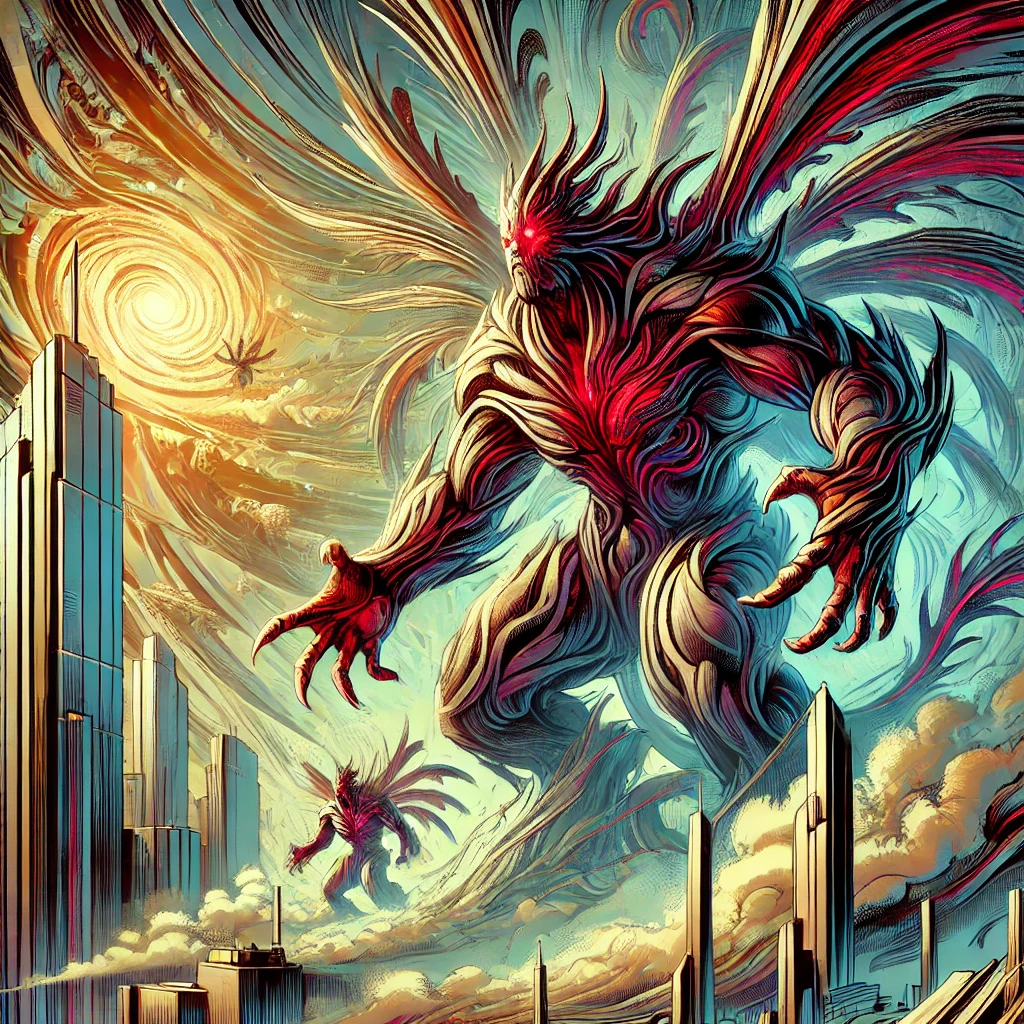残酷な天使のテーゼ [Zankoku na Tenshi no Tēze]
高橋洋子 [TAKAHASHI Yōko]
Words : 及川眠子 [OIKAWA Neko]
Music : 佐藤英敏 [SATŌ Hidetoshi]
“A Cruel Angel’s Thesis” is the opening song of “Neon Genesis Evangelion”. It is a TV anime series created and directed by Hideaki Anno, which started airing in 1995. It triggered the third anime boom in Japan during the 1990s and significantly influenced many subsequent anime works. It was also broadcast worldwide, contributing to the spread of anime culture in many countries. Although it is a very popular anime, it is not something that small children should watch. It deals with complex stories and philosophical themes, showing the new possibilities of anime.
The lyricist of this song, Neko Oikawa, was asked to make the lyrics philosophical and difficult, just like the concept of the anime. According to her, she created the lyrics by incorporating the feelings of a mother who wishes her child would not grow up.
残酷な天使のように 少年よ神話になれ
zankoku na tenshi no yō ni shōnen yo shinwa ni nare
- 残酷(ざんこく)[zankoku] : cruel
- 天使(てんし)[tenshi] : angel
- ように(ように)[yō ni] : like
- 少年(しょうねん)[shōnen] : boy
- 神話(しんわ)[shinwa] : myth
- なる(なる)[naru] : become
(translation) “Like a cruel angel, young boy, become a myth.”
The use of the word “zankoku” (=cruel) in the title and lyrics is rare, so just reading the title is startling. “Tenshi” (=angel) and “shinwa” (=myth) are terms used in religions like Judaism, Christianity, and Islam. They are not found in Buddhism or Shinto, which are closely tied to Japan, but they are frequently used concepts in literature and creative works.
蒼い風がいま 胸のドアを叩いても
aoi kaze ga ima mune no doa o tataitemo
私だけをただ見つめて微笑んでるあなた
watashi dake o tada mitsumete hohoenderu anata
そっとふれるもの もとめることに夢中で
sotto fureru mono motomeru koto ni muchū de
運命さえまだ知らない いたいけな瞳
unmei sae mada shiranai itaikena hitomi
- 青い・蒼い(あおい)[aoi] : blue
- 風(かぜ)[kaze] : wind
- 今(いま)[ima] : now
- 胸(むね)[mune] : chest
- ドア(どあ)[doa] : door
- 叩く(たたく)[tataku] : knock
- 私(わたし)[watashi] : I
- ただ(ただ)[tada] : just
- 見つめる(みつめる)[mitsumeru] : gaze
- 微笑む(ほほえむ)[hohoemu] : smile
- あなた(あなた)[anata] : you
- そっと(そっと)[sotto] : softly
- ふれる(ふれる)[fureru] : touch
- 求める(もとめる)[motomeru] : seek
- 夢中(むちゅう)[muchū] : engrossed
- 運命(うんめい)[unmei] : fate
- まだ(まだ)[mada] : still
- 知る(しる)[shiru] : know
- いたいけな(いたいけな)[itaikena] : innocent
- 瞳(ひとみ)[hitomi] : eyes
(translation) “Even if the blue wind knocks on the door of my chest now,
you just gaze at me and smile.
Engrossed in seeking and softly touching things,
your innocent eyes still don’t know fate.”
だけどいつか気付くでしょう その背中には
dakedo itsuka kidzuku deshō sono senaka ni wa
遥か未来めざすための羽根があること
haruka mirai mezasu tame no hane ga aru koto
- だけど(だけど)[dakedo] : but
- いつか(いつか)[itsuka] : someday
- 気付く(きづく)[kidzuku] : realize
- 背中(せなか)[senaka] : back
- はるか(はるか)[haruka] : distant
- 未来(みらい)[mirai] : future
- 目指す(めざす)[mezasu] : aim
- 羽(はね)[hane] : wings
(translation) “But someday you will realize
that on your back are wings to aim for a distant future.”
In the anime, the protagonists are boys and girls who are given missions regardless of their will. “The wings on the back” seem to represent those who have a mission.
残酷な天使のテーゼ 窓辺からやがて飛び立つ
zankoku na tenshi no tēze madobe kara yagate tobitatsu
ほとばしる熱いパトスで 思い出を裏切るなら
hotobashiru atsui patosu de omoide o uragiru nara
この宇宙(そら)を抱いて輝く 少年よ神話になれ
kono sora o daite kagayaku shōnen yo shinwa ni nare
- テーゼ(てーぜ)[tēze] : thesis
- 窓辺(まどべ)[madobe] : window
- やがて(やがて)[yagate] : soon
- 飛び立つ(とびたつ)[tobitatsu] : fly away
- ほとばしる(ほとばしる)[hotobashiru] : gush
- 熱い(あつい)[atsui] : passionate
- パトス(ぱとす)[patosu] : pathos
- 思い出(おもいで)[omoide] : memory
- 裏切る(うらぎる)[uragiru] : betray
- 空(そら)[sora] : sky
- 宇宙(うちゅう)[uchū] : universe
- 抱く(だく)[daku] : embrace
- 輝く(かがやく)[kagayaku] : shine
(translation) “The thesis of a cruel angel.
Soon flying away from the window,
if you betray memories with gushing passionate pathos,
embrace this universe and shine,
young boy, become a myth.”
Philosophical and ethical terms that are never used in daily life appear, and I am a little puzzled, lol.
So what is “a cruel angel”? In the anime “Neon Genesis Evangelion,” the protagonists face mysterious life forms called “The Angels”, which are like monsters (see also “Kaiju no Hanauta“). In the original Japanese version, the name is not “Angel,” but rather “使徒 / Shito” (=Apostle).
This entity seems to be projected as the “cruel angel” in the lyrics. It can be said to be a support for the boy who has to fight a harsh enemy.

By the way, looking at the lyrics, there is a part like ”宇宙(そら)”. Usually, right hiragana shows reading of the left kanji, but “宇宙” means universe, while “そら” means sky. In this case, it is required to understand both meanings poetically according to the situation. It is very troublesome, but, lol, this notation is a technique often used in modern Japanese creations, especially in manga and lyrics.
ずっと眠ってる 私の愛の揺りかご
zutto nemutteru watashi no ai no yurikago
あなただけが夢の使者に呼ばれる朝がくる
anata dake ga yume no shisha ni yobareru asa ga kuru
細い首筋を 月あかりが映してる
hosoi kubisuji o tsukiakari ga utsushiteru
世界中の時を止めて閉じこめたいけど
sekaijū no toki o tomete tojikometai kedo
- ずっと(ずっと)[zutto] : always
- 眠る(ねむる)[nemuru] : sleep
- 愛(あい)[ai] : love
- ゆりかご(ゆりかご)[yurikago] : cradle
- 夢(ゆめ)[yume] : dream
- 使者(ししゃ)[shisha] : messenger
- 呼ぶ(よぶ)[yobu] : call
- 朝(あさ)[asa] : morning
- 来る(くる)[kuru] : come
- 細い(ほそい)[hosoi] : slender
- 首筋(くびすじ)[kubisuji] : nape
- 月明かり(つきあかり)[tsukiakari] : moonlight
- 映す(うつす)[utsusu] : reflect
- 世界中(せかいじゅう)[sekaijū] : worldwide
- 時(とき)[toki] : time
- 止める(とめる)[tomeru] : stop
- 閉じ込める(とじこめる)[tojikomeru] : confine
(translation) “Always sleeping in the cradle of my love,
only you will be called the messenger of dreams in the morning.
Moonlight reflects on your slender nape.
I want to stop the time of the whole world and confine it, but…”
もしもふたり逢えたことに意味があるなら
moshimo futari aeta koto ni imi ga aru nara
私はそう 自由を知るためのバイブル
watashi wa sō jiyū o shiru tame no baiburu
- もし(もし)[moshi] : if
- ふたり(ふたり)[futari] : two
- 会う・逢う(あう)[au] : meet
- 意味(いみ)[imi] : meaning
- ある(ある)[aru] : exist
- そう(そう)[sō] : so
- 自由(じゆう)[jiyū] : freedom
- 知る(しる)[shiru] : know
- バイブル(ばいぶる)[baiburu] : Bible
(translation) “If there is meaning in the fact that the two of us met,
then I am the Bible to know freedom.”
“Bible” is also a religious term, but it is often used metaphorically. For example, “‘Mobile Suit Gundam’ is the ‘Bible’ for robot anime enthusiasts.”
残酷な天使のテーゼ 悲しみがそしてはじまる
zankoku na tenshi no tēze kanashimi ga soshite hajimaru
抱きしめた命のかたち その夢に目覚めたとき
dakishimeta inochi no katachi sono yume ni mezameta toki
誰よりも光を放つ 少年よ神話になれ
dare yori mo hikari o hanatsu shōnen yo shinwa ni nare
- 悲しみ(かなしみ)[kanashimi] : sadness
- 始まる(はじまる)[hajimaru] : begin
- 命(いのち)[inochi] : life
- 形(かたち)[katachi] : shape
- 目覚める(めざめる)[mezameru] : awaken
- 誰(だれ)[dare] : who
- 光(ひかり)[hikari] : light
- 放つ(はなつ)[hanatsu] : emit
(translation) “The thesis of a cruel angel.
Sadness begins,
when you awaken to the shape of the life you embraced.
You will shine more than anyone else,
young boy, become a myth.”
人は愛をつむぎながら歴史をつくる
hito wa ai o tsumuginagara rekishi o tsukuru
女神なんてなれないまま 私は生きる
megami nante narenai mama watashi wa ikiru
- 人(ひと)[hito] : person
- つむぐ(つむぐ)[tsumugu] : spin
- 歴史(れきし)[rekishi] : history
- 作る(つくる)[tsukuru] : create
- 女神(めがみ)[megami] : goddess
- 生きる(いきる)[ikiru] : live
(translation) “People create history while spinning love.
Without ever becoming a goddess, I will live.”
残酷な天使のテーゼ 窓辺からやがて飛び立つ
zankoku na tenshi no tēze madobe kara yagate tobitatsu
ほとばしる熱いパトスで 思い出を裏切るなら
hotobashiru atsui patosu de omoide o uragiru nara
この宇宙を抱いて輝く 少年よ神話になれ
kono uchū o daite kagayaku shōnen yo shinwa ni nare
This song is very popular at karaoke, ranking number one overall in the list of “Heisei” era songs. It was also chosen as the number one anime song in a Japanese TV program in 2020.
Thanks for reading! Feel free to comment if you have any feedback or questions.
Follow me on X.



